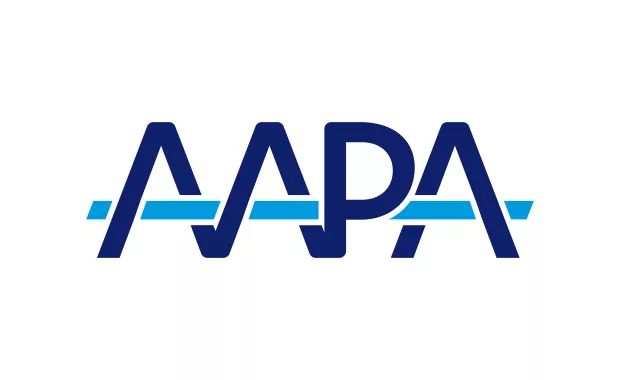After Battling Brain Cancer, PA Student Melanie Shojinaga On TikTok, Her Career Goals, and Her Advice for PAs
“I would really encourage everyone to take the time to talk to their patients.”
May 30, 2024
By Jennifer Walker
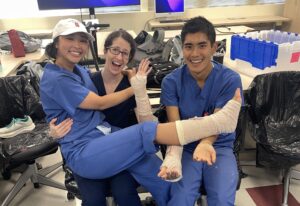
Melanie Shojinaga was in her first quarter in the PA program at Stanford University—her dream program—when she started having intense migraines. Then her ability to communicate began to change. When responding to texts, her replies were full of typos and unusual sentence structures. She also struggled with reading comprehension and recounting events. Shojinaga, who was in the middle of finals at the time, thought everything would be fine once she got more sleep. “But then it kept not being fine,” she said.
During winter break in 2021, Shojinaga was diagnosed with a rare form of brain cancer. She reached out to her professors for guidance, and they jumped into action. They helped her establish treatment at Stanford Health Care, assured her that her spot in the PA program would be saved, and supported her family throughout her cancer journey.
Over the next eight months, Shojinaga had two craniotomies to remove her aggressive brain tumor, six rounds of chemotherapy, and 36 rounds of radiation.

To begin this treatment, Shojinaga had to leave her PA program suddenly. Her professors protected her privacy, saying simply that she would be out for a while. Her classmates immediately reached out to her by text with words of support and concern. “I responded to a couple, but then I realized, ‘This is too much to be texting right now.’ My vision was still blurry, and I was so easily tired,” said Shojinaga, who was recovering from her first craniotomy at the time. “So, I decided to make a little video for them, and I sent it to the class to watch.”
Shojinaga also posted the video as a six-part series on TikTok. The platform became a way for her to be creative and make light, approachable content about a very stressful and scary situation. It was the kind of content she wanted to watch but couldn’t find much of on social media. “TikTok was a way for me to complain about things in a silly way, like the types of foods I couldn’t eat and how my hair wasn’t growing back, and make it more relatable for everybody,” said Shojinaga, who returned to Stanford’s PA program in January 2023. “I also wanted to document my journey so that I could reflect on what type of healthcare provider I want to become.”

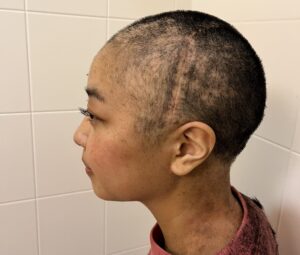
Using TikTok as an Outlet During Treatment
In her videos about her first craniotomy, Shojinaga—who was 26 when diagnosed—shared other possible outcomes of brain cancer. “I could have lost my vision. I could have had to relearn how to walk. I could have not been able to use any of my limbs. I could have not been able to use language,” she said. “I could have had a different personality depending on how it all worked out. I don’t know how I got so lucky.”
But of course, Shojinaga’s experience was still extremely difficult for herself, her family, and everyone who supported her. She shared the challenges through humor on TikTok by starting with popular audio clips, then adding text and video that was relevant to her situation. “I was seeing all these trends, and I was like, ‘I could totally apply these audios to how I’m feeling right now,’” she said.
For example, in a snippet of audio from Family Guy, a parent tells his son that they are going to the store to get notebooks, protractors, and slacks. His son says he wants blue jeans, and the parent yells, “You’re getting slacks!” The audio clip plays with a video of Shojinaga, smiling and sitting on a hospital bed. In text on the video, the list of items from the store becomes craniotomies, radiation, and chemo. Instead of wanting blue jeans, Shojinaga wants to go back to school. And when the parent yells about slacks, the text says, “You’re getting chemo.”
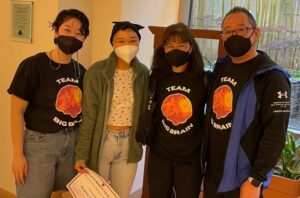
As mel.the.pa on TikTok, Shojinaga has posted approximately 200 videos about her brain cancer diagnosis and treatment. But now, as a PA student on rotations, Shojinaga, who regrettably no longer has time to make many videos, sometimes feels shy about her content. “I said some really unhinged and personal things,” said Shojinaga, who continues to get brain scans every three months. “But it was authentic. Even though it’s a little embarrassing now, it was very true to what I was going through.”
Coming Back to Her PA Program
In 2021, Shojinaga was so excited to be in her PA program that she got involved in as many activities as she could—and was devastated when she had to leave them all behind so quickly. “I wanted to be on all the leadership boards, I wanted to join all the clubs, I wanted to attend all the conferences,” she said. “For it to be completely ripped away from me, I was pissed at the world.”

A year later, when she returned to her PA program, Shojinaga had different goals. After completing many rounds of chemotherapy and radiation, she is more easily fatigued and struggles with brain fog. She feels as though she can’t pick up on concepts as quickly and needs more time to apply them. “It was so exhausting just going to school and trying to learn everything,” said Shojinaga, who withdrew from all of her extracurricular activities. “My one goal was to pass these classes, and it was still a battle.”
Shojinaga’s thesis topic has also changed. She decided to focus on fertility preservation education for adolescent and young adult cancer patients. Certain chemotherapy drugs and radiation can lead to infertility in females, according to the American Cancer Society. Before Shojinaga started chemotherapy and radiation, she was given the option to freeze her eggs. But doing so required two to three weeks of hormone therapy then surgery to remove the eggs, which would have delayed her cancer treatment.
“Ultimately for me, there wasn’t enough time,” she said. “But it’s a really big thing that’s not often talked about, especially for young cancer patients. It’s important to educate them about their fertility options early on, if possible, so they can have time to weigh their options and make informed decisions before starting treatment.”
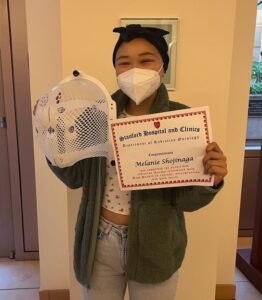
Advice from the Patient Perspective
From her time as a patient, Shojinaga has learned lessons that she feels are important to share with her fellow PAs. First, it’s important to treat neurology patients with patience and kindness. When she first visited the emergency department, she often knew the answers to simple questions, like “What’s your name?” But when she couldn’t get the words out, she started to panic. “We would constantly do neuro checks, and I would get the questions wrong every single time,” she said. “I knew I was in bad shape at that point. But my providers made me feel like things would be okay.”
She also thinks that being a strong communicator and listener is just as important as ordering tests or prescribing medications. Many of her providers took the time to listen to her without cutting her off or speeding through the conversations, and they answered all of her questions. “I trusted my providers more when I felt like they really listened to me and understood my concerns,” she said. “I would really encourage everyone to take the time to talk to their patients, find out what’s important to them, and establish good rapport.”
Along with this, several recent graduates from Stanford’s PA program also spent time talking with to Shojinaga about her professors and classes, and their work as PAs in oncology. “I know how busy PAs are, but they still prioritized my questions and helped me look to the future,” she said. “They were so kind. I want to be that support for somebody else.”
Jennifer Walker is a freelance writer in Baltimore, MD. Contact Jennifer at [email protected].
You Might Also Like
PA Student Isaac Esene Leads GoodWorks, a Nonprofit that Teaches Bystander Awareness to the Next Generation
PA Student Kaleo Lee and Classmates Start a Donation Drive to Support Those Affected by the Maui Fires in Hawaii
What PA Practice Looks like in Neuro-Oncology
Thank you for reading AAPA’s News Central
You have 2 articles left this month. Create a free account to read more stories, or become a member for more access to exclusive benefits! Already have an account? Log in.
